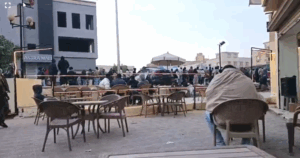Governor Minni Minawi pledges diversity in Darfur govt
Darfur’s governor Minni Minawi has pledged to involve the diversity of groups in Darfur in the state’s governance during the political event organised in Khartoum on Wednesday in which the newly appointed regional governor and head of the Sudan Liberation Movement shared his vision on Darfur’s new governance.
 Darfur's governor Minni Minawi (social media)
Darfur's governor Minni Minawi (social media)
Darfur’s governor Minni Minawi has pledged to involve the diversity of groups in Darfur in the state’s governance during the political event organised in Khartoum on Wednesday in which the newly appointed regional governor and head of the Sudan Liberation Movement shared his vision on Darfur’s new governance.
During the event, Minawi said that it is his priority to implement the Juba Peace agreement and accompanying security and humanitarian protocols to calm unrest and avoid more tribal conflicts.
“It is a priority to patch up the social fabric and launch societal reconciliations and a comprehensive dialogue between all groups, in order to end the bitterness of conflicts and wars"
The governor also said that one of his priorities is “to patch up the social fabric and launch societal reconciliations and a comprehensive dialogue between all groups, in order to end the bitterness of conflicts and wars”.
He affirmed his aim to mitigate the economic crisis and tribal tension in the different regions through mechanisms of transitional justice, social reconciliation, and the provision of security in cooperation with the joint forces.
Minawi further affirmed his cooperation with the central government to maintain security with neighbouring countries and implement various security arrangements and voluntary return programs for refugees and displaced people, including securing the areas of return and supporting war-affected children.
The governor highlighted his aim to involve youth and women at different levels of authority and stressed the importance of women’s participation in security services.
In addition, Minawi promised that he will work seriously to improve living standards, provide essential services such as drinking water and education, enhance development, fight corruption, and eliminate empowerment* (remnants of the former regime) through “strict legal methods and the rule of law”.
Minawi also said that sought negotiations with the non-signatories of the Juba Peace Agreement to reach peace as soon as possible and that he would seek to establish a donors’ conference for the development of Darfur under the auspices of the African Union, the Arab League, and the Islamic Conference.

Radio Dabanga Editor-in-Chief Kamal Elsadig
at the Paris Conference last month (RD)
Darfur unity
In an interview with Radio Dabanga last month, Minawi stressed the importance of the restoration of Darfur as a single region after the regime of ousted dictator Omar Al Bashir had “divided Darfur it into states as part of a divide and rule policy and its programme of social disintegration”.
In the interview, Minawi stressed that governance of the Darfur region is subject to the diverse range of Darfuris; “all the people of Darfur, plus the signatories to the peace agreement, civil society, and the civil administration”, and that “all of these are supposed to meet and determine exactly how the region will be managed during the transitional period”.
Hemeti’s speech
In his speech at the event organised by Minawi, Deputy Chairman of the Sovereignty Council, Mohamed Hamdan ‘Hemeti’ Dagalo also called for the implementation of the Juba Peace Agreement in Darfur to establishing security and “empower the security and justice agencies to protect citizens and their property”.
"We need to empower the security and justice agencies to protect citizens and their property”
Hemeti assured the speedy formation of the Civilian Protection Forces and promised the continuation of disarmament efforts and stop the trade and use of unlicensed vehicles.
He stressed the need to adopt a “comprehensive project for the return of displaced persons and refugees to their areas and to provide the necessary services”.
Hemeti also posed ideas to stop the recurring tribal conflicts between farmers, herders, and nomads by defining paths, securing the agricultural seasons, raising awareness, and implementing nomadic settlement projects and agricultural associations.
The Commander of the notorious Rapid Support Forces (RSF) also stressed the need to benefit from social and economic interaction with neighbouring countries to reach an understanding of flexible borders that consolidate coexistence and exchange benefits.
Central Darfur violence
Two displaced people were shot in an armed robbery in the Kibbi region, north of Nierteti in Central Darfur on Monday. A number of sheep were stolen.
“They opened fire to frighten my family, who followed them"
Witness Adam Okro told Radio Dabanga that two armed men on motorcycles, wearing uniforms of regular forces, used violence to steel a number of sheep. “They opened fire to frighten my family, who followed them”. He explained.
Two 40-year-old family members living in the North Camp Centre 7 in Nierteti were severely injured. The men were taken to Nierteti Hospital for treatment whilst their relatives filed a report with the Unified Police.
* Empowerment (tamkin) is the term with which the ousted government of Omar Al Bashir supported its affiliates in state affairs by granting them far-going privileges, including government functions and the setting-up of various companies.
The Empowerment Elimination, Anti-Corruption, and Funds Recovery Committee was formed in November 2019 after the transitional government approved a law to dismantle the institutions set-up by the regime of Omar Al Bashir and his National Congress Party (NCP). Many officials linked with the former regime are still deployed on state and locality levels.











 and then
and then